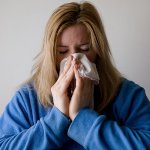Allergist Day in Russia Date in the current year: October 16, 2026
 Allergists and immunologists in Russia and some other former Soviet republics celebrate their professional holiday on October 16. Although Allergist Day hasn’t been officially recognized yet, it is sometimes referred to as World Allergist Day.
Allergists and immunologists in Russia and some other former Soviet republics celebrate their professional holiday on October 16. Although Allergist Day hasn’t been officially recognized yet, it is sometimes referred to as World Allergist Day.An allergy is a hypersensitive reaction of the immune system to antigens (typically harmless substances that the body considers to be potentially harmful). Antigens that cause allergic reactions are called allergens.
The term “allergy” was coined by the Austrian pediatrician Clemens von Pirquet in 1906. Pirquet noticed that patients who had previously received injections of smallpox vaccine had more severe reactions to a second injection. He coined the name for this hypersensitivity reaction by combining the Greek words allos (“other) and ergon (“work”). Pirquet used his observations to develop a tuberculin screen test.
However, people had had a certain idea of allergic reactions before Pirquet coined the term. For example, Avicenna’s works contain a description of the “spring runny nose”, which is known today as allergic rhinitis or hay fever.
The term “allergy” was originally used to describe any kind of hypersensitivity reaction. In 1963, British immunologists Philip Gell and Robin Coombs identified four main types of hypersensitivity reactions. According to their classification, only type I hypersensitivity reaction, which develops rapidly and involves the release of IgE antibodies, is called allergy.
The spectrum of common allergens is very wide. Allergic reactions can be caused by house dust and dust mites, plant pollen, mold, medical drugs, various foods (common food allergens include nuts, seafood, milk, citrus fruits, cereals, honey and eggs), insect bites, household chemicals, latex, etc.
The signs and symptoms of allergy are very varied and usually depend on the allergen and the sensitivity of the immune system. For example, common symptoms of pollen allergy (hay fever) are runny nose, sneezing and sometimes conjunctivitis. The symptoms of skin allergies (allergic contact dermatitis) include skin redness, swelling, itching, burning, and rashes.
The most severe form of allergy is anaphylaxis. Its symptoms may develop over minutes to hours after being exposed to an allergen. The onset of anaphylaxis is rapid; it may cause death within minutes if the person does not receive immediate medical attention. If death occurs, it is usually caused by hypoxia (since anaphylaxis may cause swelling of the larynx and bronchial spasm) or circulatory shock (insufficient blood flow to the tissues).
Fortunately, modern medicine has methods and tools for diagnosing and treating allergies. Physicians that specialize in the management and treatment of allergies are called allergists or immunologists. In some countries, the terms “allergist” and “immunologist” are used interchangeably, while in others allergists work only with allergy patients, where immunologists are also qualified to treat and manage immunodeficiencies.
In Russia and some of its neighboring countries, October 16 is unofficially celebrated as Allergist Day. It is marked by conferences, seminars, lectures, and other professional events.
- Category
- Professional Days, Unofficial Holidays
- Country
- Russia
- Tags
- Allergist Day in Russia, holidays in Russia, unofficial holidays, professional holidays, allergists and immunologists